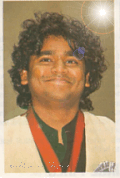| |
AR Rahman is today the
most sought after music director in the business. Roja proved that
traditional tunes can also be blockbuster hits. Songs such as "Thiruda
Thiruda", "Gentleman", "Rangeela", "Kadhal Desam" and "Minsara Kanavu"
established him as a prodigy. Modest, religious and totally dedicated to
his craft, Rahman has a great penchant for fusing music of different
traditions. Bach, Beethoven, Mozart, reggae, rock and Carnatic music are
his musical preferences.
His inspirational,
infectious numbers have won him nationwide praise in India. The Tamil film
Minsara Kanavu got Rahman the award for Best Music at the 44th National in
May, '97. Rahman also been honored with a Rajat Kamal Award for Best Music
Director, the Filmfare award, Cinema Express award, Telegu Academy
Purashkar award for the year 1992-94, Bommai Nagi Reddy award, Sumu award,
Rajiv Gandhi awards and others.
Renowned world artists
including Nusrat Fateh Al Khan, with whom he performs a duet on Vande
Mataram, have hailed Rahman as a musical genius. Rahman has in
collaborations with artists such as L. Shankar, Zakir Hussain, David
Byrne, Talvin Singh and Apache Indian - both recording and on tour. On a
recent trip to India, David Byrne met Rahman and was so impressed that he
went on to record some sessions with Rahman for a project he is currently
completing (as yet unreleased).
Singing has always been
Rahman's personal passion and very few of his fans are that he has sung on
a number of his film tracks. Vande Mataram, his first pop album, will also
be the first to showcase Rahman the singer, and his ambition is to put his
unique Indian sound on the world music stage. Today, Rahman restricts his
work to only 2 or 3 film tracks a year and has made only a few live stage
in recent years. A sold out concert was held in Kuala Lampur (Malaysia) in
October 1996, where he performed to an audience of 40,000 fans.
AR Rahman, 30 years
old, was born into a musically affluent family. His father, K.A. Sekar,
was a well known music director based in the Southern India. Growing up in
a background filled with music, Rahman began playing music from his early
childhood. After his father died when he was only 9, Rahman began
performing on the keyboards, and later as an accompaniest for various
music directors in the South Indian film industry including Ramesh Naidu,
M S Viswanathan and Illaiyaraja. His work with these musicians placed him
in good stead through some very difficult years. Finally, Rahman overcame
these hardships and qualified for a scholarship to the Trinity College of
Music (London).
Afterwards, Rahman
returned to Madras with a dream to bring an international and contemporary
world perspective to Indian music. He established a state of the art sound
and recording studio and began experimenting in sound engineering, design
and production. He also began a collection of sound samples, creating one
of the most comprehensive sonic libraries in Asia.
Rahman started his
commercial musical career in advertising, where he spent 6 years composing
jingles. Some of his memorable ad campaigns were with leading Indian
corporations such as Parry's, Tata, and Titan Watches. It was a chance
meeting at a party with Trilok Sharadha, cousin of Mani Rathnam, brought
him in contact with the renowned director and launched his stunning debut
as the music director of Roja.
AR
Rahman was born A.S. Duleep Kumar, but adopted the name AR Rahman when he
coverted to Islam. Ar Rahman is the first of a thousand names of Allah,
and Rahman is a profoundly religious person. As an individual, Rahman
leads an extremely devout religious life and credits all his musical
inspiration to Allah. He comes across as an extremely reticent and humble
individual and says, 'Music speaks, statements don't. Nobody
can be completely original because the notes are already there ... from
the notes we form a raag and from the raag a tune ... it is a process. As
far as possible, to my conscience, I try to be original. The rest is up to
Allah.'
As Rahman considers taking his new project,
Vande Mataram, to the world, he reflects on his immense popularity on the
sub-continent and whether the rest of the globe will follow his musical
lead, "music is international - only cultures are different".
.
Within the first couple of years of his Bollywood career AR Rahman
established that he was here to stay, with his digitized sound based on
pop-rock and reggae fused with traditional Indian - mainly Carnatic-folk
idioms. Carnatic is a classical Indian music form whose leading
international proponents include L Shankar (the violinist of Shakti fame),
M S Subbalakshmi - the vocalist, Vikku Vinayakam (the percussionist from
Shakti). To quote one of the leading South Indian music directors,
'Rahman's music is of the computer age. It is digital but
intelligent , not just noise. He concentrates on his melody and has not
deviated totally from his traditional
sounds."
|






